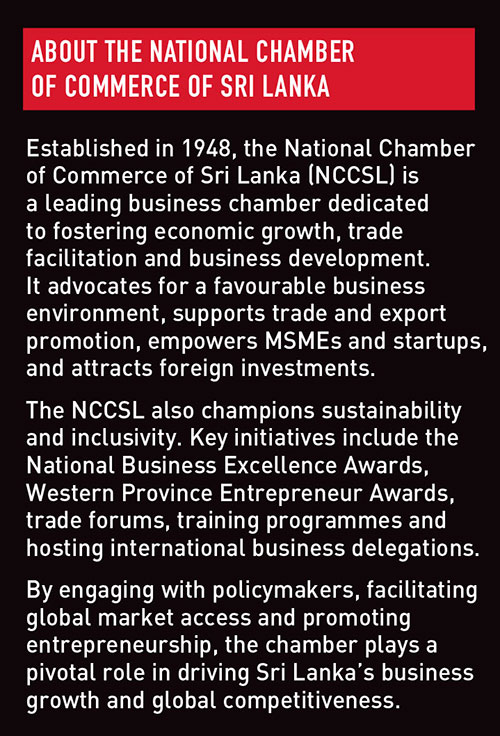EXPANDING SRI LANKA’S GLOBAL FOOTPRINT
Anura Warnakulasooriya highlights the need to champion broader market access
Sri Lanka faces challenges in expanding its global reach – including trade barriers; export reliance on tea, apparel, rubber; and limited market diversification

Q: What strategies does the National Chamber of Commerce of Sri Lanka (NCCSL) employ to enhance Sri Lanka’s global presence and attract foreign business?
A: The NCCSL employs several key strategies to enhance the country’s global presence and attract foreign business. These initiatives are designed to showcase our potential, foster international partnerships, and create a favourable environment for trade and investment.
We also facilitate bilateral trade initiatives, business delegations and trade missions to strengthen global ties, while also offering B2B matchmaking services to connect local businesses with international partners.
Moreover, the chamber focusses on export promotion and market expansion for Sri Lankan businesses, ensuring that they can tap into new international markets.
By forging MOUs and strategic partnerships with global business councils, trade organisations and chambers of commerce, the NCCSL helps establish robust networks and smooth market entry for foreign investors, positioning Sri Lanka as an attractive investment destination.
Q: How does the NCCSL support local exporters in accessing global markets and overcoming trade barriers?
A: We support local exporters by providing essential advocacy, market intelligence, and trade information from the Ministry of Foreign Affairs and the Export Development Board (EDB).
Through B2B matchmaking, networking events, trade delegations and global trade fair participation, the chamber connects exporters with international buyers and partners.
A sector specific export promotion strategy focusses on high growth sectors and industries – such as agriculture, food processing, IT-BPM, manufacturing and handicrafts – to gain access to the right markets. The NCCSL offers technical training to help exporters meet international standards and certifications along with guidance on export procedures.
The chamber also assists exporters in leveraging trade agreements and FTAs, with countries such as India, Pakistan, Thailand and China. Export readiness training builds capacity in market entry, branding, pricing and negotiation strategies for MSMEs.
Digital trade promotion through platforms including www.fromsrilanka.com enables direct access to foreign buyers while the issuance of certificates of origin ensures smooth export processes.

Q: As for working with the government to shape policies that favour global trade and investment, how does the chamber pursue its goals?
A: The NCCSL actively shapes policies that support global trade and investment through strategic collaborations with government agencies.
It works with the Board of Investment (BOI) to improve investor incentives, simplify business registration and attract FDI, while partnering with the EDB to expand market access and enhance export competitiveness.
The chamber engages with the Ministry of Finance, the Central Bank of Sri Lanka, and the Ministry of Trade and Commerce, to influence trade policy making, tariffs, trade agreements and customs procedures.
Additionally, it collaborates with Sri Lanka Customs and the Inland Revenue Department (IRD) to streamline tax policies, and import and export processes.
It represents business interests by advising the government on key issues such as taxation, trade barriers and investment climate improvements, participating in parliamentary committees, policy discussions and budget consultations, to ensure that policies facilitate global trade and investment growth.
Q: And how does the NCCSL collaborate with various sectors and industries, to enhance Sri Lanka’s trade and commerce prospects? What key sectors do you believe have the most potential for growth in the world market?
A: The chamber collaborates with various industry specific trade associations including the Information and Communication Technology Agency of Sri Lanka (ICTA), apparel, ceramics and glass, agriculture, rubber, tea, spices and construction among others.
With representation across 25 sectors, the chamber works to enhance trade and commerce by facilitating industry specific initiatives, offering market intelligence and advocating for policies that support each sector’s growth. This collaboration helps identify opportunities, address challenges and promote Sri Lanka’s diverse industries on the global stage.
Regarding potential growth, the sectors with the most promise are those that focus on high end niche products. These include areas where Sri Lanka can emphasise its quality, innovation and differentiation over price.
Q: And finally, what are the challenges and opportunities you see for Sri Lanka in expanding its global reach – and how is the NCCSL addressing them?
A: Sri Lanka faces challenges in expanding its global reach – including trade barriers; export reliance on tea, apparel, rubber; and limited market diversification.
The NCCSL addresses this by working with the government to reduce tariffs, facilitating trade delegations, promoting value added exports such as branded tea, organic products and ICT services.
Attracting foreign investments is hindered by policy instability and regional competition. The chamber advocates for business friendly reforms and collaborates with key bodies to improve investor confidence.
Inefficiencies in logistics, high shipping costs and international supply chain disruptions also impact exports. To this end, we promote infrastructure upgrades and better regional connectivity.
Moreover, the skills gap and brain drain are challenging workforce readiness. In response, the NCCSL supports training in high demand sectors, and fosters entrepreneurship for startups and MSMEs. To expand exports, it builds trade linkages, organises business missions and leverages digital platforms including fromsrilanka.com.
Additionally, it streamlines export processes and plans consultancy programmes to support MSMEs and women led businesses. Committed to addressing these challenges, the NCCSL continues to drive Sri Lanka’s long-term economic growth.
Anura Warnakulasooriya is the President of the National Chamber of Commerce of Sri Lanka.
Telephone 4741788
Email services@nationalchamber.lk
Website www.nationalchamber.lk

